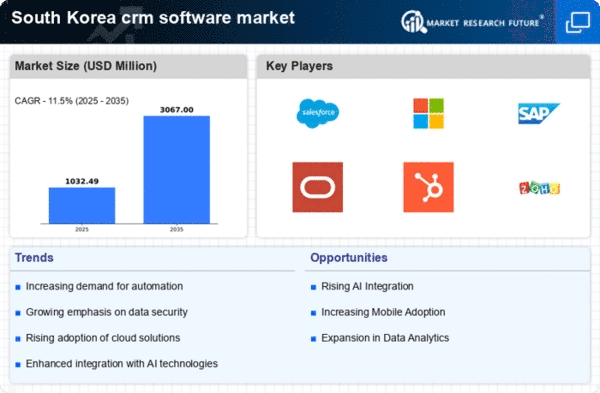Emergence of Mobile CRM Solutions
The rise of mobile technology is reshaping the crm software market in South Korea, with an increasing number of businesses adopting mobile crm solutions. As mobile devices become ubiquitous, organizations are recognizing the need for flexibility and accessibility in managing customer relationships. Recent surveys indicate that over 50% of sales professionals in South Korea prefer using mobile applications for crm tasks. This trend is driving software vendors to develop mobile-friendly solutions that enable users to access customer information and manage interactions on-the-go. The emergence of mobile crm solutions is likely to enhance productivity and responsiveness, thereby influencing the overall dynamics of the crm software market.
Increased Focus on Data Analytics
In the crm software market, the emphasis on data analytics is becoming increasingly pronounced in South Korea. Organizations are recognizing the value of data-driven decision-making and are investing in crm solutions that provide comprehensive analytics capabilities. This trend is supported by the fact that approximately 65% of businesses in South Korea are leveraging data analytics to enhance their marketing strategies. The ability to analyze customer data allows companies to identify trends, optimize campaigns, and improve overall performance. Consequently, the demand for crm software that offers advanced analytics features is likely to rise, as businesses seek to gain a competitive edge through informed decision-making.
Rising Demand for Customer-Centric Solutions
The crm software market in South Korea is experiencing a notable shift towards customer-centric solutions. Businesses are increasingly recognizing the importance of understanding customer needs and preferences. This trend is driven by the desire to enhance customer satisfaction and loyalty. According to recent data, approximately 70% of companies in South Korea are prioritizing customer experience initiatives, which directly influences their investment in crm software. As organizations strive to create personalized experiences, the demand for advanced crm solutions that offer analytics and insights is likely to grow. This focus on customer-centricity is reshaping the crm software market, pushing vendors to innovate and provide tailored solutions that meet the evolving expectations of businesses.
Growth of E-Commerce and Digital Sales Channels
The expansion of e-commerce and digital sales channels in South Korea is significantly impacting the crm software market. With online shopping becoming increasingly prevalent, businesses are seeking effective ways to manage customer interactions across various digital platforms. Recent statistics indicate that e-commerce sales in South Korea have surged by over 20% in the past year, prompting companies to adopt crm solutions that can integrate seamlessly with their online operations. This growth necessitates robust crm systems that can track customer behavior, manage leads, and facilitate communication across multiple channels. As a result, the crm software market is likely to see a surge in demand for solutions that cater specifically to the needs of e-commerce businesses.
Regulatory Compliance and Data Privacy Concerns
The crm software market in South Korea is also being shaped by regulatory compliance and data privacy concerns. With the implementation of stricter data protection laws, businesses are increasingly focused on ensuring that their crm systems comply with legal requirements. Recent reports suggest that nearly 75% of companies in South Korea are prioritizing data privacy in their crm strategies. This heightened awareness is prompting organizations to seek crm solutions that offer robust security features and compliance capabilities. As a result, the demand for crm software that addresses these regulatory challenges is likely to grow, influencing the market landscape and driving innovation in security features.
















